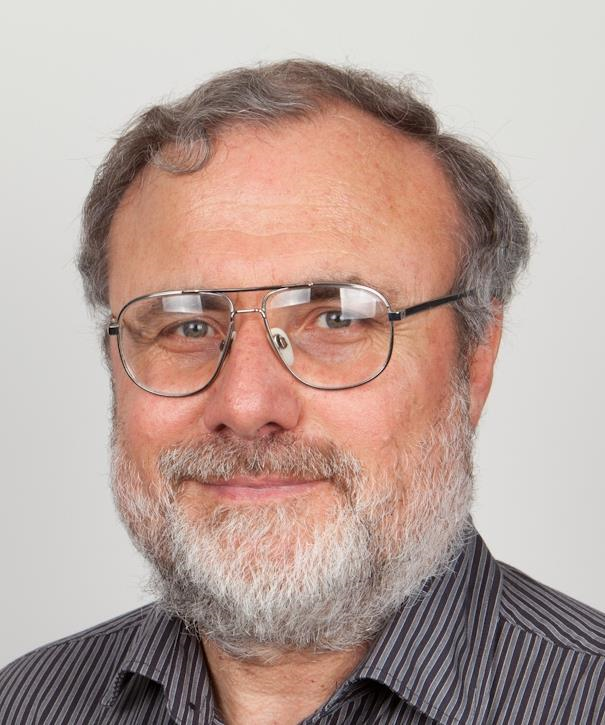
Gerard Bruitzman
Gerard Bruitzman
Many of us understand that humanity is living amidst an unprecedented global meta-crisis, marked by many deep, complexly interrelated, and compounding local, national and global crises: educational, ecological, economic, health, moral, political, social, technological, et al.
We tend to respond with a mix of at least three ways to these crises. First, we tend to withdraw from the world’s complexity into more familiar, perhaps more comfortable places. Second, we tend to engage with the world’s complexity on our own terms – setting our own demands for the ways the world should be. Third, we tend to open evermore fully to the world’s complexity and, in doing so, we tend to change in all sorts of ways from being a relatively conventional citizen within local living conditions to becoming a worldcentric guardian with an integrative dynamic understanding of people in diverse living conditions in many localities with their various ways of living with our interrelated local, national and global issues.
In this article, we present a skeletal outline of integrative dynamics. First, we identify variables in the spheres of education, economics, environment, governance and health at each of eight stages of human existence, and in the spheres of science, spirituality, sustainability and gender relations using a who (views of the knower) x how (methods of knowing) x what (nature of reality) x why (theory of value) dynamic. Then we introduce a few evolutionary multi-level selection processes, a few complex integral realist perspectives, and the Club of Rome’s recent work on reinventing prosperity, which are a few constructive ways worldcentric guardians are working with our current complex challenges.
Full-Spectrum Development in Five Spheres of Life
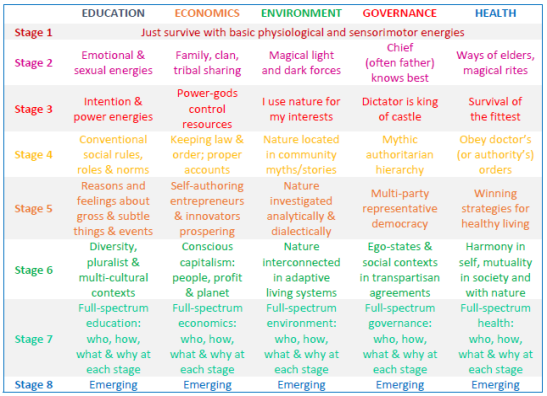
Education
There are many lenses that can be used in our inquiries (Edwards, 2010). Here are seven taken from Ken Wilber’s Integral Theory: stages and lines/waves of development, states of consciousness, types and drives, quadrants, bodies and shadow. In our discussion, only stages and lines/waves of development are engaged to some degree, while many other lenses are relatively absent.
Seven Important Lenses in Integrative Education
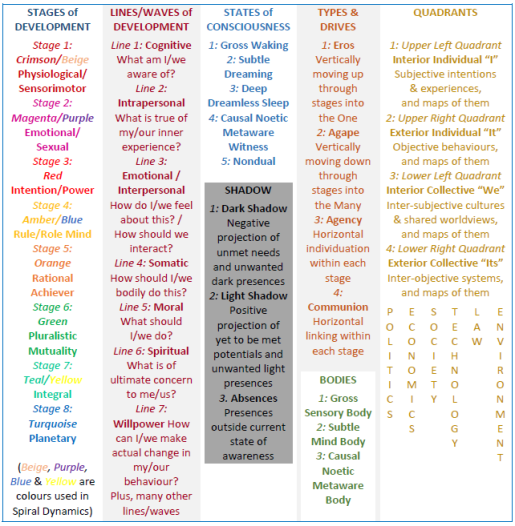
The stages of human development become fully explicit in integrative worldviews (O’Fallon, 2011; Wilber, 2016, 2017a). They correspond to the perennial principle of adaequatio (adequateness) – the understanding of the knower must be adequate to the thing/event/relations/contexts to be known (Schumacher, 1978). They are, as we will see, a vital key in understanding human variability within individuals, in interpersonal relations, and in local, national and global communities.
Here is a brief overview of eight stages of human existence. Everybody begins their life at birth in stage 1 experiencing basic physiological/sensorimotor challenges, and continues to meet physiological/sensorimotor challenges within each of any later stages throughout their lives. Likewise, when there are growth appropriate personal, interpersonal and socio-cultural challenges and supports in play, everybody grows into stage 2 emotional/sexual challenges during their first year and within each of any later stages, stage 3 intention/power challenges during their second year and within each of any later stages, stage 4 social rules/roles/norms challenges during childhood within families and communities with varying mixes of mythic/rational/multi-cultural/integrative values and within each of any later stages, stage 5 formal reasoning/feeling challenges during adolescence/adulthood within rational/evidence-based/self-authoring communities and within each of any later stages, stage 6 diversity/pluralist/mutuality challenges during adulthood within multi-stakeholder/ transpartisan communities and within each of any later stages, stage 7 integrative challenges during mature adulthood in uncommon communities working to fully integrate body, mind and spirit in self, culture and nature, and stage 8 planetary challenges for those rare sages becoming ever more deeply compassionate and fully wise human beings.
Growing up and down through these eight stages, there are multiple lines/waves of development in intelligences, behaviours, cultures and systems. Amongst various intelligences within individuals and their cultures, there are cognitive intelligence (what I am/we are aware of), emotional intelligence (how do I/we feel about this), moral intelligence (what should I/we do) and spiritual intelligence (what is of ultimate concern to me/us). Amongst various systems within human societies, there are political, economic, social, technological, legal and environmental systems.
Amidst these eight stages of existence, there are present five states of consciousness (gross waking, subtle dreaming, deep dreamless sleeping, metaware witnessing, and nondual); four types and drives (eros ascending into the One and agape embracing the Many through vertical stages, masculine agency and feminine communion within each horizontal stage); four quadrants (interiors and exteriors of individuals and collectives); gross, subtle and causal bio-psycho-socio-cultural energies; personal, interpersonal and socio-cultural shadow issues (unseen variables in events); and nonduality (not one, not two, unqualifiable).
Last, in this brief list of important variables in human development, anyone can experience at each of life’s stages crucial events that can be significant in freezing (or releasing) bio-psycho-socio-cultural energies into (or out of) one’s characteristic habits of attractions ↔ addictions and avoidances ↔ allergies in food, drink, body, emotions, sex, intentions, power, rules, roles, norms, reasons, feelings, diversity, pluralism, mutuality, integration and unity. These addictions and allergies often play significant roles in growth/open ↔ fixed/closed mindsets as unwanted shadow issues (Witt, 2014, 2016).
Moreover, everybody tends to grow up through, and grow down to integrate these and other variables in, these eight stages of existence when they experience three key factors. First, somebody or something challenges the leading edge or integrative quality of their personal, interpersonal or socio-cultural growth (in their work with Deliberately Developmental Organizations, Robert Kegan and Lisa Laskow Lahey (2016) call this edge). Second, they learn to develop and practice appropriate skills to meet and play with these challenges (groove). Third, they participate in a community of practice that deliberately supports each person in a group, and their group, team or class, with their set of learning experiences in each of their many learning cycles from beginner to gradual learner to capable teacher (home).
In sum, in an integrative context, education is a lifelong process from birth to deeply wise and fully compassionate old age as our span and depth of aesthetic, moral and truthful concerns grow from being mainly concerned with my egocentric interests in childhood to our ethno-/socio-/nation-centric interests in adolescence to the worldcentric interests of all of us on our beautiful planet in adulthood to the wellbeing of all living beings over many generations in our mature years. Thus, given growth appropriate living conditions for individuals in their communities, education can be a major force for human emancipation (Schieffer & Lessem, 2014; Gidley, 2016).
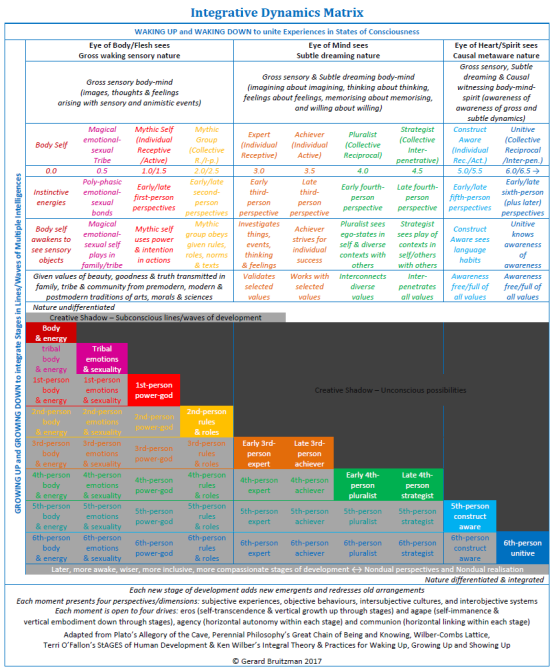
Economics
Many of us understand that economics and environment are delicately interwoven on our beautiful finite planet (Pope Francis, 2015; Vaughan-Lee, 2016).
The purpose of full spectrum economics is to create and provide resources so that everybody is enabled to thrive in their lives, relationships and communities, generating widely shared prosperity at local, national and global levels, and regenerating a healthy environment for all living beings. To do this, full spectrum economics works to locate the vital contributions of different economic systems, and then integrate these vital contributions into functional flexible flows that serve the thriveability of all living members on our planet (Dawlabani, 2013; Freeman, 2015).
Here are a few examples. At tribal stages, people need the security of kinship in a mysterious world so they use goods to simply keep their family or clan alive and together. At imperial stages, people become power-gods, expressing themselves freely regardless of others. They tend to want as much as possible. At authoritarian stages, people obey laws to conserve their one true mythic order so that they can secure future rewards later in life, retirement, or an after-life. They tend to provide for their family first and save for a rainy day. At achievement stages, people strive strategically to prosper for themselves using their hard-earned skills to develop and market goods and services. They tend to focus on making significant profits and attaining significant status rewards through their enterprises. At social egalitarian stages, people explore their inner selves and their relations with others. They tend to believe that all people are equal, regardless of their race, colour, sex or creed, and that wealth needs to be distributed so that as many people as possible can experience at least basic bio-psycho-socio-spiritual thriveability in their lives. Thus, they tend to put into action in their B-Corporations/conscious businesses a version of 3 bottom lines, the 3Ps: people (or social benefit), prosperity (or economic benefit), and planet (or ecological benefit).
Sean Esbjörn-Hargens’ MetaCapital Framework
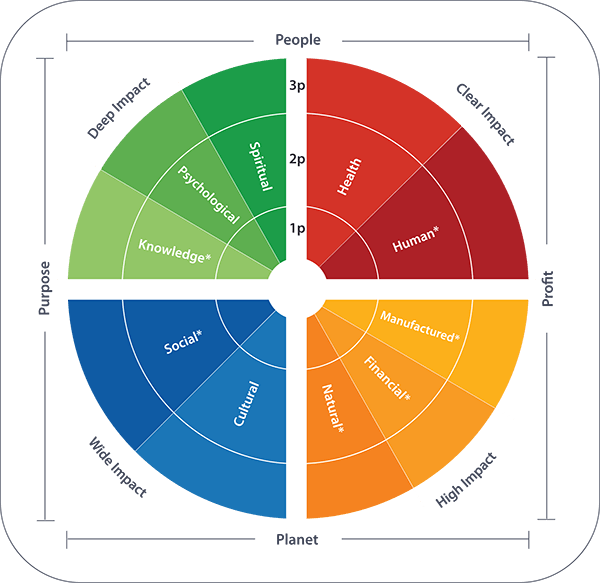
As mentioned above, full spectrum economics works to turn these stages of economic activities into functional flows (Dawlabani, 2013; Freeman, 2015). This differs from the usual ways these economic systems operate in the marketplace, where “selfishness beats altruism within groups,” however in an evolutionary, multi-level selection process “altruistic groups beat selfish groups” (Wilson, 2015; Bunzl & Duffell, 2017). Some versions, such as the Conscious Business Declaration, recognise 4Ps: presence, people, profits and planet. New versions in development include a few Six Capital models (financial, manufactured, intellectual, human, social and relationship, and natural) (Gleeson-White, 2014); the MetaCapital Framework, which measures 4 types of impact (clear, high, wide and deep) with 10 types of capital (cultural, financial, health, human, knowledge, manufactured, natural, psychological, social and spiritual) which produces 4 bottom lines (people, purpose, planet and profit); the Reporting 3.0 Platform, which uses 4 blueprints in a green and inclusive economy, regenerative capitalism, finance system (future fit reporting, multi-capital accounting, data support for macro/meso/micro, and the reporting demands of new business models); and the ThriveAbility Equation, which works with eight capitals (human, relationship, social, natural, infrastructure, manufactured, intellectual and financial) within social floors and environmental ceilings in a regenerative, inclusive world (Wood, 2017).
Environment
An integrative reading of the environment acknowledges that people see the environment in different ways at each stage of their existence. An abiding question remains: Who is seeing What, and How and Why is the seeing being done? In more detail: Who (seer’s perspective) x How (ways of seeing) x What (seen [and unseen] variables) x Why (purpose and meaning), and sometimes When (time) x Where (place) need to be added (Esbjörn-Hargens, 2016).
Here are a few examples. Aboriginal elders with an intimate understanding of their local environment provide for their clan by using their skills in reading changes in signals from weather, plants, animals and poly-phasic animistic events. A traditional farmer maintains important records of any economic event related to their business and supports their operation by careful stewardship of their local environment. A modern entrepreneur finds an exciting opportunity to develop some natural resources and goes on to take advantage of this situation to make some significant profits. An environmentalist, using their selected mix of qualitative and quantitative methods, studies for example the changing patterns in climate systems in a tropical rainforest. She or he collaborates with other environmentalists – each using their own selected mix of qual/quan methods – to explain their interdisciplinary readings of their ongoing qual/quan studies to interested parties, who themselves need to be suitably qualified in these qual/quan methods to understand such complex work.
Thus, each person or group of people has their own understanding of the environment and environmental issues, such as global warming, the current bio-diversity extinction crisis, et al. However, each view is true, but partial or incomplete, often failing to include the views of others. Instead of fighting amongst each other in defence of one’s precious insights, it is time to join with others to discover the knowledge in various accounts of information, and the wisdom in differentiating and integrating various accounts of who is seeing, how and why seeing is being done, and what is seen. Then we can work together to create context sensitive bio-psycho-socio-cultural responses to our interwoven local, national and global problems.
Governance
Each stage of human existence prefers their form of governance. These stages of governance range from anarchic survival based groups; to families, clans and tribes where chief knows best; to empires dominated by a dictator; to authoritarian law and order with strong power hierarchies; to multi-party representative democracy which exposes the competitive interests of financial, political and technological elites; to social democracy which connects diverse stakeholders in dialogues to construct transpartisan agreements (for example, recent work at the United Nations authorising 17 Sustainable Development Goals and the COP21 Paris Climate Agreement amidst those nations and organisations that have formally agreed to participate in these global agreements); to emerging forms of democracy such as tech democracies, like MiVote Australia (Barnes & Ralley, 2017), and flexible flow democracies, like sociocracy, holacracy, functional democracy (Maalouf, 2014) or crowdocracy (Watkins & Stratenus, 2016), that involve identifying, appreciating, and integrating the full spectrum information, knowledge and wisdom of diverse stakeholders in new ways.
United Nations Sustainable Development Goals
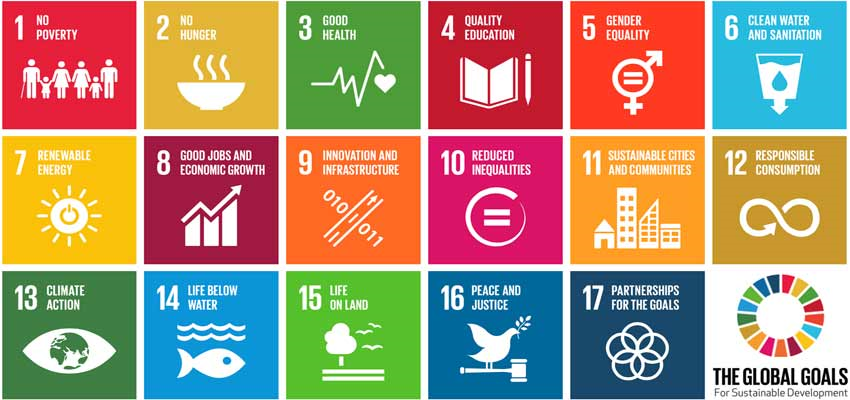
Keep in mind the following caveats. In an integrative worldview, various stages of governance are present and interacting in varying degrees within each person, in their interpersonal relationships, and in their local, national and planetary communities. Few people, however, can hold what is good across the full spectrum of human development. Conservative people tend to conserve what is good in earlier stages of existence, such as family bonds, law and order, and their traditional values, using mainly first-person (subjective “I”) arts and second-person (inter-subjective “we”) moral relations, as indicated in the Integrative Dynamics Matrix above and in the Who x How x What x Why Matrix below. Whereas progressive people tend to also enact what is good at later stages of existence, such as evidence-based claims, human rights, and planetary values, using third-person (objective “it”) sciences and fourth-person mutuality-in-diversity (interconnecting first-person “I”, second-person “we”, and third-person “it” contexts and practices). Few, however, develop fifth-person unity-in-diversity awareness (prioritising and integrating diverse first- to fourth-person contexts and practices). Very few, therefore, can govern with full spectrum wisdom (with conscious access to first-, second-, third-, fourth-, fifth-person, and evermore inclusive views and practices) in compassionate service for the thriveability of all living beings with their interconnecting stages of development within each living being and amongst all living beings on our planet.
Also, the current state of democracy troubles many people (Gerzon, 2016; McIntosh, 2016; Wilber, 2017b). Unhealthy polarisations of left and right undermine attempts to develop healthy transpartisan (both poles and more) agreements, and various global problems, such as the tragic refugee crisis involving over 60 million people seeking refuge from violence, overwhelm the political, economic and social resources of many countries, including Sweden (Stålne, 2016). Suggestions for better governance include: 1) better acceptance of both diversity and limits of knowledge and opinion; 2) safe places for independence of thought and inter-independent collaborations; 3) withdrawal from toxic master-slave relations through empowerment (from coercion over) into mutuality with multiple stakeholders; 4) a wise integration process that generates shared solutions out of disclosing to others personal/group views and values, and the various contexts of observed behaviours (Watkins & Stratenus, 2016).
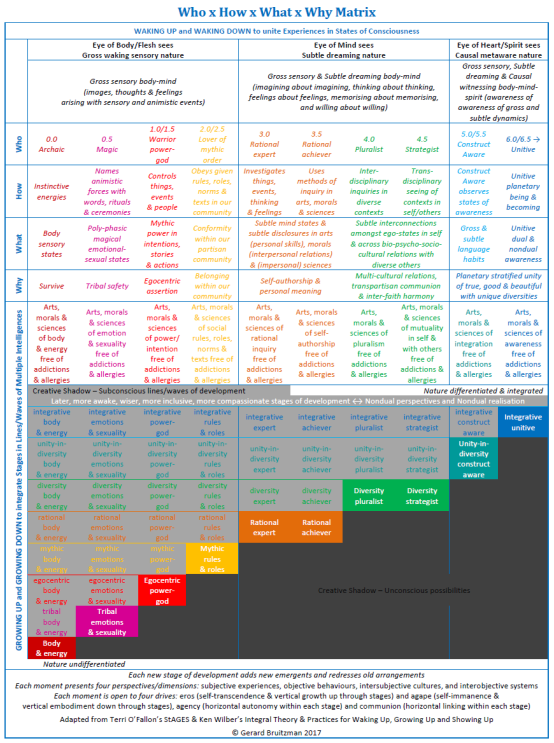
Health
Our idea of health can hold varying degrees of depth and breadth. For some, health involves growing and flourishing their many capabilities in body, mind and spirit, while co-ordinating their developing capabilities with their families and friends, with other people in their local, national and planetary communities, and with their ecological and social systems. For integrative people, health also includes the different ways people understand the who, how, what, and why of health.
Using various epistemic views, people see health in many ways. For a child, their view tends to focus on having a healthy body-mind; for an adolescent, on having healthy relationships with peers; for an adult, on having healthy families, communities, workplaces, social and ecological systems; and for an elder, on being a wise and compassionate presence amidst each of these stations of life through which people are going through on their life journeys.
Using various methodologies, people live healthy lives in various ways. Some monitor closely using a selected mix of measures their mix of physiological, psychological, socio-cultural and spiritual variables. Some work to address the quality of their interpersonal relationships in their own lives and families, and in their local, national and planetary communities. Some pursue their own or shared vision, values, purpose and meaning for life in service for the thriveability of their own life and all living beings on our planet.
Using various ontologies, people differ in what they consider to be real in domains of health. Traditional societies base their understanding of body/mind/spirit health issues in the context of the perennial philosophy’s Great Chain of Being (Nasr, 1989; Smith, 2012). Modern societies tend to reduce body/mind/spirit to measurable variables with objective science marginalising subjective experience and intersubjective relations, thus they authorise mainly material/scientific/technological interventions (Sheldrake & Shermer, 2016; Wilber, 2017b). Postmodern societies tend to step back from modern one-size-fits-all reductionisms to consider an eclectic mix of contexts – a mix of inherited and constructed ways of being, relating and doing – in re-visioning and working with their health issues (Bradbury, 2015). Integrative societies tend to work to integrate all dimensions of body, mind and spirit in self, culture and nature (Laszlo, 2014, 2016; Bradbury & Torbert, 2015; Gunnlaugson & Brabant, 2016; McGuigan & Popp, 2016; Chopra & Kafatos, 2017; Wilber, 2017a).
Using various axiologies, people present changing combinations of factors for why they want their own lives and the lives of others to be healthy. Some factors that are valued in various places have already been mentioned here. Many other factors, like various moral questions and ethical dilemmas, such as key decisions about what are appropriate levels of public funding of a community’s chosen ways of dealing with their health issues within the ever-changing contexts of multiple overlapping jurisdictions, also need to be addressed.
Science, Spirituality, Sustainability and Gender Relations
The integrative dynamics approach outlined here can be applied in many spheres of life. It includes and reworks vital insights found in Sean Esbjörn-Hargens’ (2016) complex integral realist approach:
who (epistemic views: ways of seeing, using mixes of capabilities in body [senses of sight, smell, sound, taste and touch; life-energy; emotions and sexuality], mind [faculties of imagination, reason, feelings, memory and will], and spirit [noetic heart or true metaware seer of body-mind] within each and across multiple stages of human existence)
x how (methodological practices: methods, techniques and skills of knowing that need to be learnt and to be practised in arts, morals and sciences)
x what (ontologies: nature of seen and unseen realities in [subjective] being, [inter-subjective] relating and [objective and inter-objective] doing dimensions)
x why (axiologies: theories of pre-personal, personal, inter-personal and transpersonal value in local, national and global communities).
Below we provide some examples in the spheres of science, spirituality, sustainability and gender relations.
Integrative Dynamics in Science
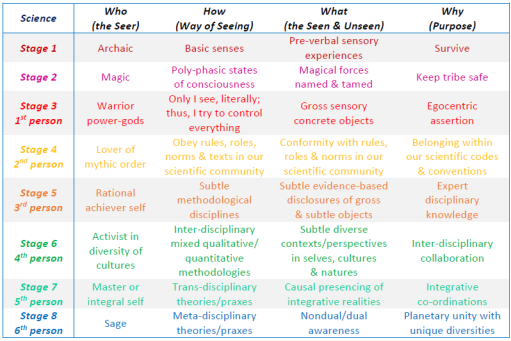
Integrative Dynamics in Spirituality
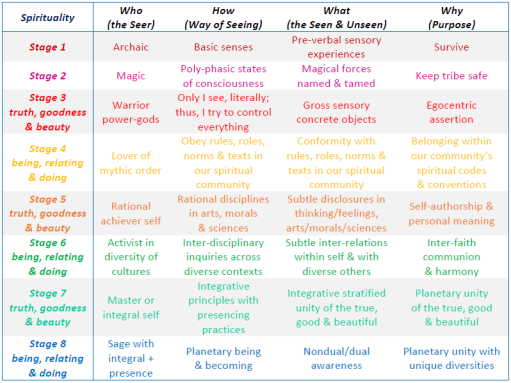
Integrative Dynamics in Sustainability
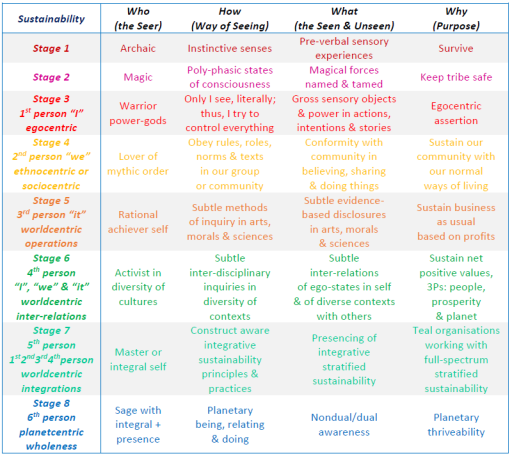
Integrative Dynamics in Gender Relations
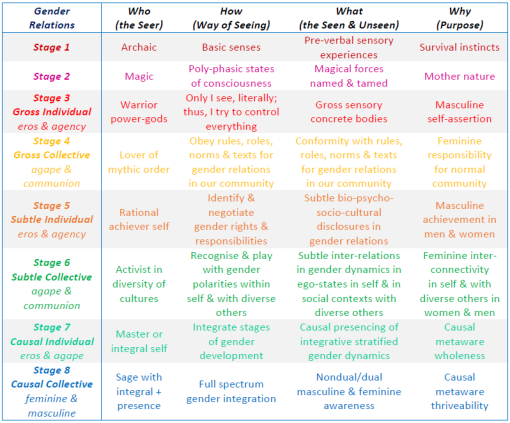
An Integrative Dynamics Integration Process
Now we ask: What can be done to co-ordinate these varying sets of capabilities within each stakeholder and across various stakeholders to generate healthy outcomes at each moment in our inter-relating local, national and global challenges in our meta-crisis?
Before giving an answer to our big question, here are some caveats. First, what can take a lifetime to appreciate is how each person and each group of people tends to envision, embody and enact varying sets of capabilities in different living conditions. A person, for example, at home may relax to present stage 3 or 4 emotions (when only my or our way counts), whilst at work may strive to present stage 5 emotions (when a social contract has primacy). A group of people, for example, while sharing a dinner together may discuss their strategies for future directions in their organisation, such as how to transition from stage 6 conscious capitalism to stage 7 regenerative capitalism, however, whilst participating in a board meeting they may demand full compliance with current stage 3 (dictatorial), stage 4 (bureaucratic) or stage 5 (social contract) legal obligations, when legal arrangements in current local, national and global jurisdictions have their full attention.
Second, what will be underscored here is that no person or group of people has access to full spectrum everything with all lines/waves of development in intelligences, behaviours, cultures and systems from stages 1 to 8 fully enlivened with free-flowing creative heartfulness free of addictions and allergies. What is much more likely is that each person or group has varying levels of capabilities in each of many lines/waves of development. Thus, there are examples of stage 6 scientists with stage 4 spirituality promoting stage 5 sustainability in their work, and many other examples of individuals and groups with all sorts of mixes of bio-psycho-socio-cultural capabilities in all sorts of ever-changing bio-psycho-socio-cultural living conditions.
Third, given these considerations on the varying capabilities of people in various situations, wiser and more compassionate people can be found amongst those who demonstrate in living their lives that they will not allow themselves in various situations to collapse into polarising, “us versus them”, privileging familiar perspectives while disallowing unfamiliar perspectives, adversarial, dualist dynamics. These wiser and more compassionate people with post-conventional integrative “all of us” stage 7 capabilities, who are worthy of being called worldcentric guardians, need to be appreciated in our communities for the ways that they demonstrate that they are our primary exemplars of personal, interpersonal and social-cultural flourishing.
Here is a brief introduction to an integrative dynamics integration process, which is based on the integral coherence process introduced by Alan Watkins and Ken Wilber (2015) in Wicked & Wise. There are three important steps. First, conduct a thorough integrative mapping of the problem, using, as indicated in our discussion above, many lenses to make explicit as many variables as is appropriate that are in play in the current bio-psycho-socio-cultural situation. Second, bring suitably qualified worldcentric guardians, who have grown through and integrated egocentric and ethnocentric stages in relevant lines/waves of development, altogether in citizen councils to discuss freely and weigh fairly the merits and limits of each available perspective (using for example who, how, what, why, when & where lenses) on an issue. Third, integrate as well as possible the outcomes of these negotiations into more enlightened, more compassionate and transpartisan ways of working with our inter-related local, national and global issues in various personal, interpersonal and socio-cultural contexts.
At this point, we mention briefly two alternatives to our integrative dynamics integration process: the crowdocratic process proposed by Alan Watkins and Iman Stratenus (2016), and the Simpol Solution, which offers a way for ordinary citizens to be involved in the simultaneous delivery of global policy across many nations, proposed by John Bunzl and Nick Duffell (2017).
Worldcentric Guardians
Now we ask: What is involved in being a worldcentric guardian?
Some of us would like to develop the literacies/fluidities in body/mind/spirit to live well with a rainbow vision of full spectrum self/culture/nature in the heat of each moment we are living/participating in at home/work/play. But, alas, all too often we tend to collapse into old “us versus them” habits of being, relating and doing that were generated in relatively good or bad living conditions in earlier egocentric and ethnocentric stages of our personal, interpersonal and socio-cultural development. Therefore, personal, interpersonal and social-cultural flourishing – as interpreted in the lineage of Aristotle, Karl Marx, Roy Bhaskar and Paul Marshall as the “free flourishing of each is the condition of the free flourishing of all” in worldcentric communities striving to create heartful mutuality of persons free of master-slave relations of dominance, oppression and exploitation – remain elusive goals for many of us in our lives, communities, and interconnections with each other on our planet.
However, some people are ahead of many of us in working out how to envision, embody, and enact these three goals. People like Bede Griffiths in uniting East and West in his soul, Huston Smith in presenting gracefully the world’s religions, Ban Ki-moon in overseeing work on the UN Sustainable Development Goals, which are in his words an “action plan for people, planet, peace and prosperity”, Roy Bhaskar (2016) in revealing a dialectic of freedom, Martin Luther King in confronting segregation, Nelson Mandela in overcoming apartheid, Don Beck, Said Dawlabani, Elza Maalouf, et al. in applying Spiral Dynamics Integral, Karen O’Brien in facing the personal, political and practical adaptive challenges of climate change (O’Brien & Selboe, 2015), Doshin Roshi, Thomas Keating, Richard Rohr and Cynthia Bourgeault (2016) in presencing contemplative views and practices, the Dalai Lama in living his religion of kindness, Miriam Martineau in becoming an integral parent, Deepak Chopra and Menas Kafatos (2017) in engaging with scientific physicalists in discussions on consciousness, Jim Garrison in leading Ubiquity University, Fred Kofman in inspiring the Conscious Business Academy at LinkedIn, John Bunzl and Nick Duffell in authoring the Simpol Solution for our global problems, Bence Ganti and Dennis Wittrock in leading the Integral European Conference, Frederic Laloux (2016) and Jos de Blok in reinventing organisations, Lawrence Chickering and James Turner in launching The Transpartisan Review, Robin Lincoln Wood (2017) in providing a ThriveAbility Equation which we can use in our lives to create the thriveable futures we know are possible, and Terri O’Fallon (2011) and Ken Wilber (2016, 2017a) in integrating ways of waking up states of consciousness with ways of growing up through stages of consciousness in their corresponding views of human development are a few of many worthy of being called worldcentric guardians.
A Complex Integral Realist Perspective
Paul Marshall is another person who exemplifies worldcentric guardianship. With his complex integral realist perspective, he invites us to integrate vital insights in:
Premodernity
- A balance of verstand and vernunft (analytical and dialectical thinking)
- The interplay of science, philosophy and spirituality
- The notions of Kosmos and unity-in-diversity
- Philosophy as a way of life, as life changing practice as well as theory
- Deep interiority and profound intuitions of Being and Nonduality
Modernity
- Science (framed free of simple reductionisms in a paradigm of complexity)
- Reason and rationality (in balanced, positive forms)
- Fraternal face of humanism with democracy and human flourishing
- Clear developmental advances beyond literal myth and exclusive dogma
- Differentiation of the three value spheres (arts, morals and sciences)
Postmodernity
- Defence of pluralism, diversity and marginalized voices
- Critique of isolated rational autonomous subject
- Critique of abstract universality and instrumental rationality
- Reality is a construction (in part)
- Meaning as context-dependent and contexts as boundless
Integrative Metatheories – Roy Bhaskar’s Critical Realism/metaReality, Edgar Morin’s Complex Thought, and Ken Wilber’s Integral Theory and Practice
- Integrative, non-reductionist, maximally inclusive
- Strong defence of the subject and its emergent causal powers and agency
- Dialectical ↔ developmental interface, dialectical universality, unitas multiplex
- Vision of the Kosmos as a structured open totality with tendential directionality
- Remedies to four biases present in modernity
- analytical over dialectical
- epistemology over ontology
- presence over absence
- exterior over interior
and remedies to five distortions present in postmodernity
-
- blind to the universal elements that unite humanity
- reduction of subject to intersubjective networks
- rejection of all universality
- extreme judgmental relativism
- no objective truth, only interpretations, life as a pastiche (adapted from Marshall, 2016, 183).
To see this and other complex integral realist perspectives unpacked in detail, we invite you to go to Marshall (2016) and Bhaskar et al. (2016).
A Finer Future is Possible
For 40+ years the Club of Rome has worked to change current economic systems. Their 2016 report A Finer Future is Possible asks a vital question:
Climate change, rising inequality and environmental impact show how urgently we need a more sustainable model of social and economic development. But is it actually possible to change the economic system without collapse?
The underlying assumption is that the dominant global economic system, focused on continuous economic growth, unlimited levels of consumption, and minimal regulation needs to change. But change is hard.
Humanity is on an economic treadmill, which requires ever-rising throughput of resources, and which is creating environmental destruction while also widening social divisions. In short, the current economic system is moving human society towards an eventual collapse” (Lovins, Wijkman, Fullerton, Wallis & Maxton, 2016, 5-6).
In Reinventing Prosperity, Graeme Maxton and Jorgen Randers (2016) present what they believe are 13 politically feasible proposals that need to be implemented in our necessary transition from business as usual to sustainable futures. Below we present some significant factors from their important work. We invite you to notice when they tend to use “us versus them” habits more than “all of us” integrative dynamics.
Based on work done on modelling scenarios for the future using computers at the Massachusetts Institute of Technology, the Club of Rome published The Limits to Growth (LTG) in 1972. Their book considered 12 scenarios, and found that in every case except one (the sustainability scenario) humanity faced collapse. One scenario in particular LTG World3 generated considerable alarm in sustainability communities.
Future Trends in the LTG World3 Scenario
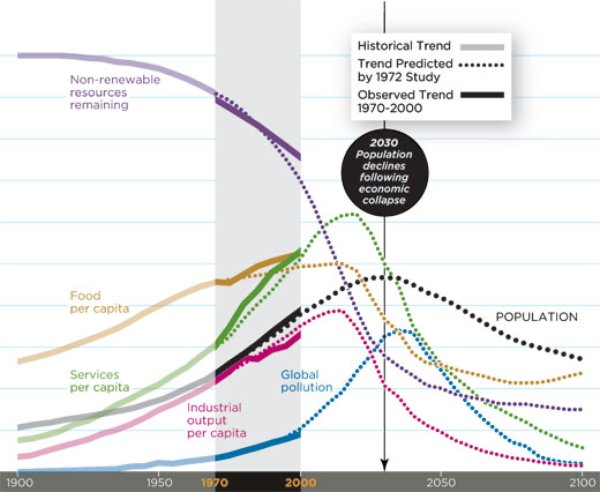
Source: Lovins et al., 2016, 14.
“The dotted lines in the graph show the “business as usual” scenario we have actually experienced. Use of resources grows, population rises, availability of non-renewable resources begins to fall until, at some point, around the mid-2030s, there is collapse. The solid lines on the graph are the actual data from the time The Limits to Growth was published until 2000” (Lovins et al., 2016, 14).
This modelling was brought up to date in 2014 in Graham Turner’s research paper, “Is Global Collapse Imminent?” His research verified that humanity has continued to move along the business as usual (BAU) trend line, warning that, “the BAU scenario results in collapse of the global economy and environment (where standards of living fall at rates faster than they have historically risen due to disruption of normal economic functions), subsequently forcing population down” (Turner, 2014, 3).
Given this 40+ year trend in agreement with the LTG World3 BAU scenario, we ask: What is our current situation?
Four of Nine Planetary Boundaries Already Crossed
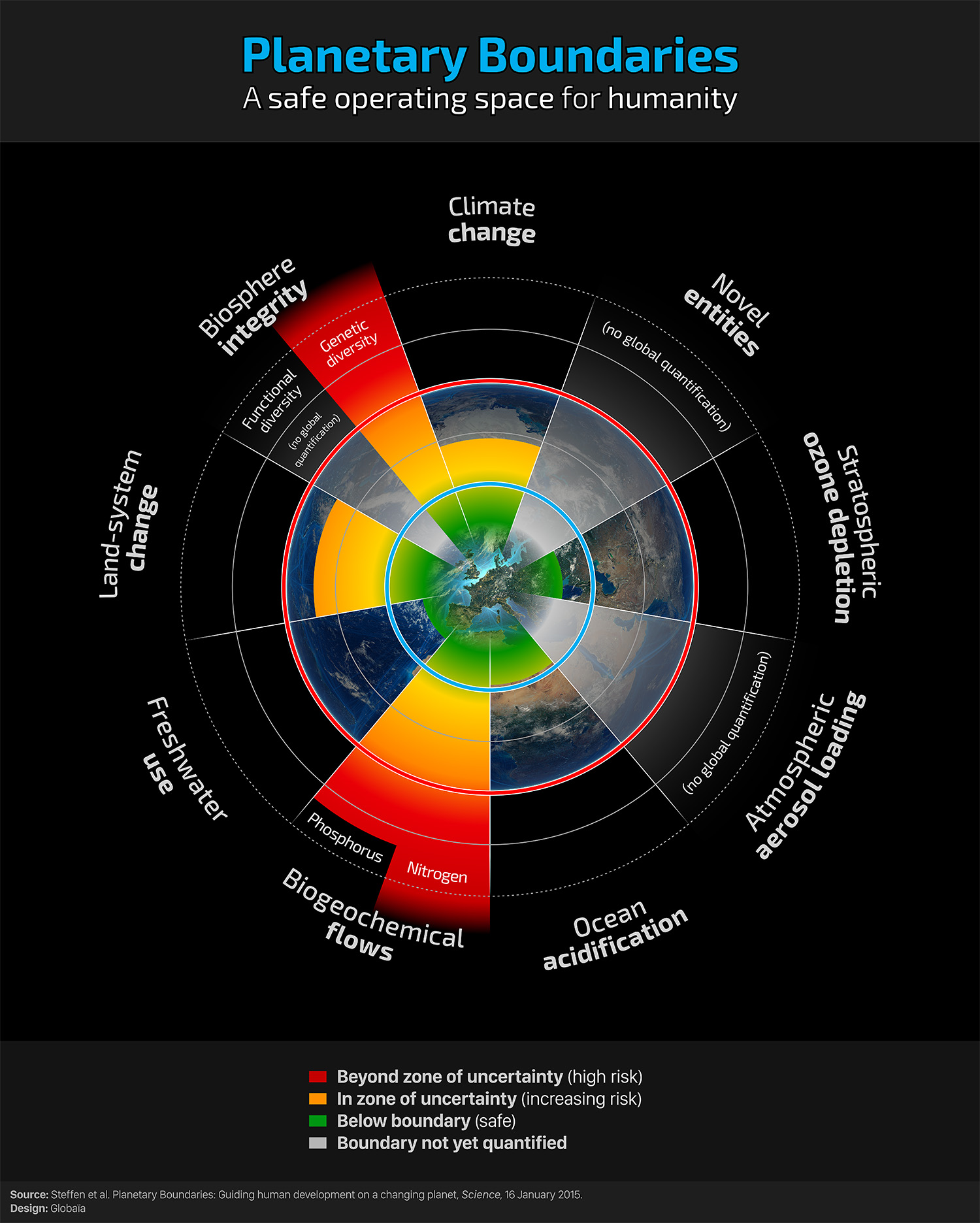
Source: Lovins et al., 2016, 15.
“Humanity currently lives,” according to the Global Footprint Network, “as if we had the resources of 1.5 planets” and the GFN concludes that “this can only continue for a short time before our planetary systems force a return to equilibrium.” In their research, Johan Rockström et al. (2009) have identified nine planetary life support systems or boundaries essential for human survival. They and Will Steffen et al. (2015) found that we have already crossed four of these boundaries: climate change, biosphere integrity, land-system change, and biogeochemical cycles (phosphorus and nitrogen cycles) (Lovins et al., 2016, 15).
Given this ongoing depletion of resources in our current unsustainable situation, the Club of Rome, plus many other activists, declares that humanity must change current economic systems. We present here brief outlines of three possible visions of change from BAU to more sustainable ways of living.
Club of Rome’s Economic Vision
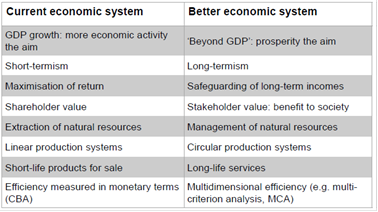
Source: Lovins et al., 2016, 36.
From Business as Usual to Regenerative Capitalism
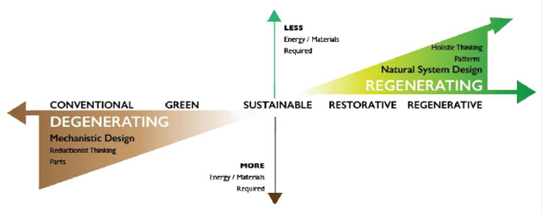
Source: Lovins et al., 2016, 37.
Club of Rome’s Ecological Vision
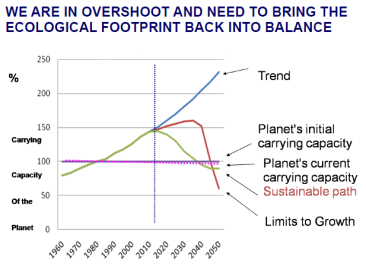
Source: Lovins et al., 2016, 68.
Here are their 13 proposals to reduce unemployment, inequality, and climate change:
- Shorten the length of the work year to give everyone more leisure time.
- Raise the retirement age to help the elderly provide for themselves for as long as they want.
- Redefine “paid work” to cover those who care for others at home.
- Increase unemployment benefits to maintain demand during the transition.
- Increase the taxation of corporations and the rich to redistribute profits, especially from robotization.
- Expand the use of green stimulus packages by printing money or raising taxes to help governments respond to climate change and the need for redistribution.
- Tax fossil energy and return the proceeds in equal amounts to all citizens to make low-carbon energy more competitive.
- Shift taxes from employment to emissions and resource use to reduce ecological footprint, protect jobs, and cut raw materials use.
- Increase death taxes to reduce inequality and philanthropy while boosting government income.
- Encourage unionization to boost incomes and reduce exploitation.
- Restrict trade where necessary to protect jobs, improve well-being, and help the environment.
- Encourage smaller families to reduce the pressure of humanity on the planet.
- Introduce a guaranteed liveable income for those who need it most and give everyone peace of mind (Maxton & Randers, 2016).
In taking the time we need to consider these and various other proposals from various agencies, like the Evolution Institute (Wilson, 2015), Integral City (Hamilton, 2008), Institute for Sustainable Futures (Fam, Palmer, Riedy & Mitchell, 2016), Simpol Solution (Bunzl & Duffell, 2017), Sustainable Brands (Thurm, 2016), UN Sustainable Development Goals, ThriveAbility Foundation (Wood, 2015, 2017; Wood & Bruitzman, 2016), et al., and in discussing freely and weighing fairly the merits and limits of any proposal within all sorts of local, national and global bio-psycho-socio-cultural living conditions, we will probably need to keep on reminding and encouraging ourselves to do what we need to do to grow out of polarising “us versus them” habits into inter-relating “all of us” integrative dynamics.
The ThriveAbility Multi-Capital Equation
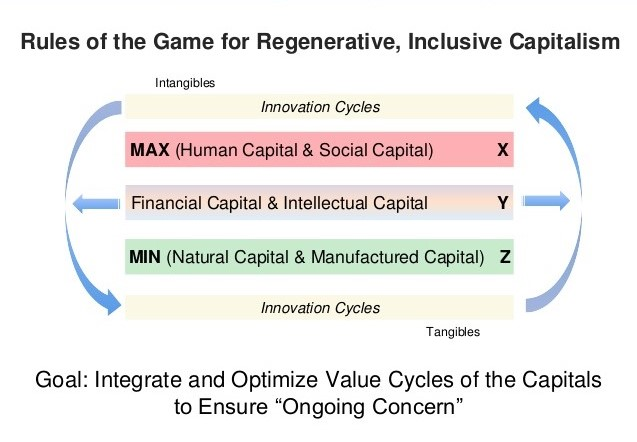
The goal in a thriving, regenerative inclusive economy should be to maximise the thriving of human, relationship and social capital, for the least amount of natural, infrastructure and manufactured capital, through the value adding activities enabled by intellectual and financial capital. This would appear to be unarguable common sense as well as impeccable economic, social and ecological logic (Wood, 2017, 56).
In joining with other people in multi-stakeholder dialogues to generate and construct multi-stakeholder transpartisan agreements, in which we work out how to formalise, adjust and execute desired outcomes so that they are a suitable fit for a current set of bio-psycho-socio-cultural living conditions, we will probably need to become more skilful in noticing, understanding and letting go any attachment to any troublesome interior ego states and exterior bio-psycho-socio-cultural living conditions in which we privilege either only “me” or polarising “us versus them” habits more than integrative “both poles and more” dynamics.
A finer future is possible when we value the guidance of worldcentric guardians – those inspiring people who are our primary exemplars of personal, interpersonal and social-cultural flourishing. A finer future is possible when we decide to do the bio-psycho-socio-cultural work that enables us to grow through and integrate egocentric exclusive “me” and ethno-/socio-centric polarising “us versus them” into worldcentric inclusive “all of us” ways of living. A finer future is possible when we become worldcentric guardians ourselves – inspiring people with our wise and compassionate presence amidst each stage of life through which people are passing through on their life journeys – in their lives, relationships, and communities in their living conditions (Viljoen, 2015; Küstenmacher, Haberer & Küstenmacher, 2016).
Conclusion
We have made many bold claims. We say that using integrative dynamics is a more comprehensive way of working with our multiple interconnected challenges in our various local, national and global living conditions than many current polarising ways. We suggest that many people are beginning to see what is involved in making the necessary effort to consider the who, how, what and why at each stage of human development from first-person (egocentric “me”) to second-person (ethno-/socio-centric “us”, our group) to third-person (worldcentric “all of us, humans” operations) to fourth-person (worldcentric “all of us, living beings” interconnections) to fifth-person (worldcentric “all of us, all beings” integrations) to evermore awake, inclusive, wiser and more compassionate ways of being, relating and doing. We hope that in putting into practice integrative dynamics many people will become competent worldcentric guardians with the capabilities to put into action wiser and more compassionate ways of serving the thriveability of all living beings with their inter-relating stages of development within each being and across all beings on our planet.
Although much too much has been left unsaid here with only two of many possible lenses – a variable number of stages in a few lines/waves of development – introduced to some degree in our rather compact discussion on integrative dynamics, hopefully enough has been said to confirm, as Alan Watkins says in his eye-opening chat on crowdocracy with Ken Wilber at Integral Life, “None of us are as smart as all of us” altogether (Wilber & Watkins, 2016).
In sum, what we are trying to do is to see, accept and bring the whole human universe altogether. As Deepak Chopra and Menas Kafatos (2017) reveal so eloquently in their wonderful new book on qualia-based science, “You are the universe.”
“Welcome, everyone! (Our global) community of faith has one great aim: to help people grow in love for neighbour, self, the earth, and God. That’s why we’ve come together, and that’s why we’re glad you are here” (McLaren, 2016, 62, amended).
About the Author
Gerard Bruitzman is involved in the spheres of human development, perennial philosophy, integrative studies and global thriveability. In the 1980s, he discovered Bede Griffith’s The Marriage of East and West, Huston Smith’s Tales of Wonder and Ken Wilber’s The Atman Project – 3 bold attempts to integrate Eastern and Western views of human development – and he continues to be inspired by current integrative leaders. Recently, he co-authored with Robin Lincoln Wood A ThriveAbility Scenario: Toward Thriving, Integrative Human Beings in a Thriving, Integrative, Global World. He holds a Bachelor of Arts (Psychology) (Honours) and a Master of Management (Strategic Foresight). Email: gjbruitzman @ hotmail.com.
References
Barnes, Jon & Jim Ralley. (2017). Democracy Squared: A Digital Revolution That’s About to Democratise Democracy. Flux Publishing.
Bhaskar, Roy. (2016). Enlightened Common Sense: The Philosophy of Critical Realism. New York: Routledge.
Bhaskar, Roy, Sean Esbjörn-Hargens, Nicholas Hedlund & Mervyn Hartwig. (Eds.). (2016). Metatheory for the 21st Century: Critical Realism and Integral Theory in Dialogue. New York: Routledge.
Bourgeault, Cynthia. (2016). The Heart of Centering Prayer: Nondual Christianity in Theory and Practice. Boulder, CO: Shambhala.
Bradbury, Hilary. (Ed.). (2015). The SAGE Handbook of Action Research, 3rd ed. London: Sage Publications.
Bradbury, Hilary & William Torbert. (2015). Eros/Power: Love in the Spirit of Inquiry. Tucson, AZ: Integral Publishers.
Bunzl, John & Nick Duffell. (2017). The Simpol Solution: Solving Global Problems Could Be Easier Than We Think. London: Peter Owen Publishers.
Chopra, Deepak & Menas Kafatos. (2017). You Are the Universe: Discovering Your Cosmic Self and Why It Matters. New York: Harmony Books.
Dawlabani, Said E. (2013). Memenomics: The Next Generation Economic System. New York: SelectBooks.
Edwards, Mark G. (2010). Organizational Transformation for Sustainability: An Integral Metatheory. New York: Routledge.
Esbjörn-Hargens, Sean. (2016). Developing a Complex Integral Realism for Global Response. In Roy Bhaskar, Sean Esbjörn-Hargens, Nicholas Hedlund & Mervyn Hartwig. (Eds.). Metatheory for the 21st Century: Critical Realism and Integral Theory in Dialogue. New York: Routledge.
Fam, Dena, Jane Palmer, Chris Riedy & Cynthia Mitchell. (Eds.). (2016). Transdisciplinary Research and Practice for Sustainability Outcomes. New York: Routledge.
Freeman, Jon. (2015). Reinventing Capitalism: How We Broke Money and How We Fix It, From Inside and Out. London: SpiralWorld.
Gerzon, Mark. (2016). The Reunited States of America: How We Can Bridge the Partisan Divide. Oakland, CA: Berrett-Koehler Publishers.
Gidley, Jennifer M. (2016). Postformal Education: A Philosophy for Complex Futures. Springer International Publishing.
Gleeson-White, Jane. (2014). Six Capitals: The Revolution Capitalism Has to Have – or Can Accountants Save the Planet? Sydney: Allen & Unwin.
Gunnlaugson, Olen & Michael Brabant. (Eds.). (2016). Cohering the Integral We Space: Engaging Collective Emergence, Wisdom and Healing in Groups. Integral Publishing House.
Hamilton, Marilyn. (2008). Integral City: Evolutionary Intelligences for the Human Hive. Gabriola Island, BC: New Society Publishers.
Kegan, Robert & Lisa Laskow Lahey. (2016). An Everyone Culture: Becoming a Deliberately Developmental Organization. Boston, MA: Harvard Business Review Press.
Küstenmacher, Marion, Tilmann Haberer & Werner Tiki Küstenmacher. (2016). God 9.0: Where Christianity Could Grow Spiritually. www.gott90.de.
Laloux, Frederic. (2016). Reinventing Organizations: An Illustrated Invitation to Join the Conversation on Next-Stage Organizations. Nelson Parker.
Laszlo, Ervin. (2014). The Self-Actualizing Cosmos: The Akasha Revolution in Science and Consciousness. Rochester, VT: Inner Traditions.
Laszlo, Ervin. (2016). What is Reality? The New Map of Cosmos and Consciousness. New York: SelectBooks.
Lovins, Hunter, Anders Wijkman, John Fullerton, Stewart Wallis & Graeme Maxton. (2016). A Finer Future is Possible: How Humanity Can Avoid System Collapse and Craft a Better Economic System. Report. The Club of Rome.
Maalouf, Elza S. (2014). Emerge! The Rise of Functional Democracy and the Future of the Middle East. New York: SelectBooks.
McGuigan, Richard J & Nancy Popp. (2016). Integral Conflict: The New Science of Conflict. Albany, NY: SUNY Press.
McIntosh, Steve. (2016). Why Centrism Fails and How We Can Better Achieve Political Cooperation. White Paper. Institute for Cultural Evolution.
McLaren, Brian D. (2016). The Great Spiritual Migration: How the World’s Largest Religion Is Seeking a Better Way To Be Christian. New York: Convergent.
Marshall, Paul. (2016). A Complex Integral Realist Perspective: Towards a New Axial Vision. New York: Routledge.
Maxton, Graeme & Jorgen Randers. (2016). Reinventing Prosperity: Managing Economic Growth to Reduce Unemployment, Inequality and Climate Change. Vancouver, BC: Greystone Books.
Meadows, Donella H, Dennis L Meadows, Jorgen Randers & William W Behrens III. (1972). The Limits to Growth: A Report for the Club of Rome’s Project on the Predicament of Mankind. New York: Universe Books.
Nasr, Seyyed Hossein. (1989). Knowledge and the Sacred. Albany, NY: SUNY Press.
O’Brien, Karen & Elin Selboe. (2015). The Adaptive Challenge of Climate Change. New York: Cambridge University Press.
O’Fallon, Terri. (2011). StAGES: Growing Up is Waking Up – Interpenetrating Quadrants, States and Structures. Developmental Life Design.
Pope Francis. (2015). Laudato Si’: Encyclical Letter On Care for Our Common Home. https://laudatosi.com.
Rockström, Johan, et al. (2009). A Safe Operating Space for Humanity. Nature, 461(7263), 472-475.
Schieffer, Alexander & Ronnie Lessem. (2014). The Integral University: Holistic Development of Individuals, Communities, Organisations and Societies. Prospects, 44(4), 607–626.
Schumacher, E.F. (1978). A Guide for the Perplexed. New York: Harper & Row.
Sheldrake, Rupert & Michael Shermer. (2016). Arguing Science: A Dialogue on the Future of Science and Spirit. Rhinebeck, NY: Monkfish Book Publishing.
Smith, Wolfgang. (2012). Science & Myth: With a Response to Stephen Hawking’s The Grand Design, 2nd ed. Tacoma, WA: Angelico Press/Sophia Perennis.
Spiral Dynamics Integral, http://spiraldynamicsintegral.nl/en/.
Stålne, Kristian. (2016). Values as Complex Adaptive Systems: An Analysis of the Swedish Response to the Migration Crisis from a Value Systems Perspective. Migration and the European Welfare States Conference. Malmö, Sweden.
Steffen, Will, et al. (2015). Planetary Boundaries: Guiding Human Development on a Changing Planet. Science, 347(6223), 1259855.
Thurm, Ralph. (2016). Integral Thinking and True Materiality: A New Impetus Embracing Purpose, Success and Scalability for Thriving Organizations. Ebook. Sustainable Brands.
Turner, Graham. (2014). Is Global Collapse Imminent? MSSI Research Paper No. 4. Melbourne Sustainable Society Institute, The University of Melbourne.
Vaughan-Lee, Llewellyn. (Ed.). (2016). Spiritual Ecology: The Cry of the Earth, 2nd Point Reyes, CA: The Golden Sufi Center Publishing.
Viljoen, Rica. (2015). Organisational Change & Development: An African Perspective. Randburg, South Africa: Knowres Publishing.
Watkins, Alan & Ken Wilber. (2015). Wicked & Wise: How to Solve the World’s Toughest Problems. Chatham, UK: Urbane Publications.
Watkins, Alan & Iman Stratenus. (2016). Crowdocracy: The End of Politics. Chatham, UK: Urbane Publications.
Wilber, Ken. (2016). Integral Meditation: Mindfulness as a Path to Grow Up, Wake Up, and Show Up in Your Life. Boulder, CO: Shambhala.
Wilber, Ken. (2017a). The Religion of Tomorrow: A Vision for the Future of the Great Traditions. Boulder, CO: Shambhala.
Wilber, Ken. (2017b). Trump and a Post-Truth World. Ebook. Integral Life.
Wilber, Ken & Alan Watkins. (2016). The End of Politics: How Crowdocracy Can Transform Our Government (And Save Us from Ourselves). Audio. Integral Life.
Wilson, David Sloan. (2015). Does Altruism Exist? Culture, Genes, and the Welfare of Others. New Haven, CT: Yale University Press.
Witt, Keith. (2014). Integral Mindfulness: From Clueless to Dialed-in—How Integral Mindful Living Makes Everything Better. Tucson, AZ: Integral Publishers.
Witt, Keith. (2016). Shadow Light: Illuminations at the Edge of Darkness. Tucson, AZ: Integral Publishers.
Wood, Robin Lincoln. (2015). A Leader’s Guide to ThriveAbility: A Multi-Capital Operating System for a Regenerative Inclusive Economy. Bloomington, IN: AuthorHouse.
Wood, Robin Lincoln. (2017). Synergise! 21st Century Leadership. Self-published.
Wood, Robin Lincoln & Gerard Bruitzman. (2016). A ThriveAbility Scenario:
Toward Thriving, Integrative Human Beings in a Thriving, Integrative, Global World. Journal of Futures Studies, 20(3), 55-78.
